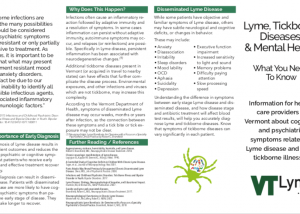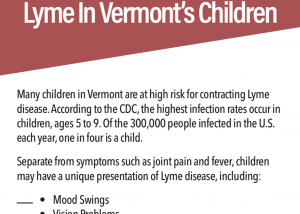Some Vermonters are quickly diagnosed and effectively treated for tickborne diseases, experiencing no further complications. Others are among the 10-20% who experience ongoing complications from a Lyme infection – even after treatment.
Living with a tickborne disease is not easy. Some people experience chronic fatigue, headaches, and joint or muscle pain. Others have cognitive difficulties leaving them forgetful, unable to continue working, or safely drive a vehicle.
Dr. Neil Spector has described Lyme disease as “the infectious disease equivalent of cancer” due to its potential complexity and the need for an individualized treatment approach. Despite the fact that Vermont has one of the highest incidence rates of Lyme disease in the USA, access to physicians who specialize in tickborne diseases is extremely limited in our state.
People with complex, ongoing health problems related to Lyme or tickborne diseases may not appear ill even when their pain is extreme, or their experience is extremely difficult.
- A study by Klempner, et al., showed “There is considerable impairment of health-related quality of life among patients with persistent symptoms despite previous antibiotic treatment for acute Lyme disease”.
- A study by Steere, et al., concluded that “Months to years after the initial infection with B. burgdorferi, patients with Lyme disease may have chronic encephalopathy [abnormal brain function], polyneuropathy [degeneration of peripheral nerves], or less commonly, leukoencephalitis [severe brain inflammation].”
- A more recent study showed the quality of life for post-treatment Lyme patients was lower than patients with other chronic diseases, “including congestive heart failure, diabetes, multiple sclerosis and arthritis”. In addition, the Lyme patients had, “significantly lower health quality status, more bad mental and physical health days, a significant symptom disease burden, and greater activity limitations” when compared to the general population. They also reported “impairment in their ability to work, increased utilization of healthcare services, and greater out of pocket medical costs”.
- The National Institute of Allergies and Infectious Diseases noted these studies “reinforced the evidence that patients reporting PTLDS symptoms have a severe impairment in overall physical health and quality of life”.
Vermonters with a complex tickborne disease need understanding, support, and access to care. In addition, early diagnosis and effective treatment may prevent ongoing health complications.




